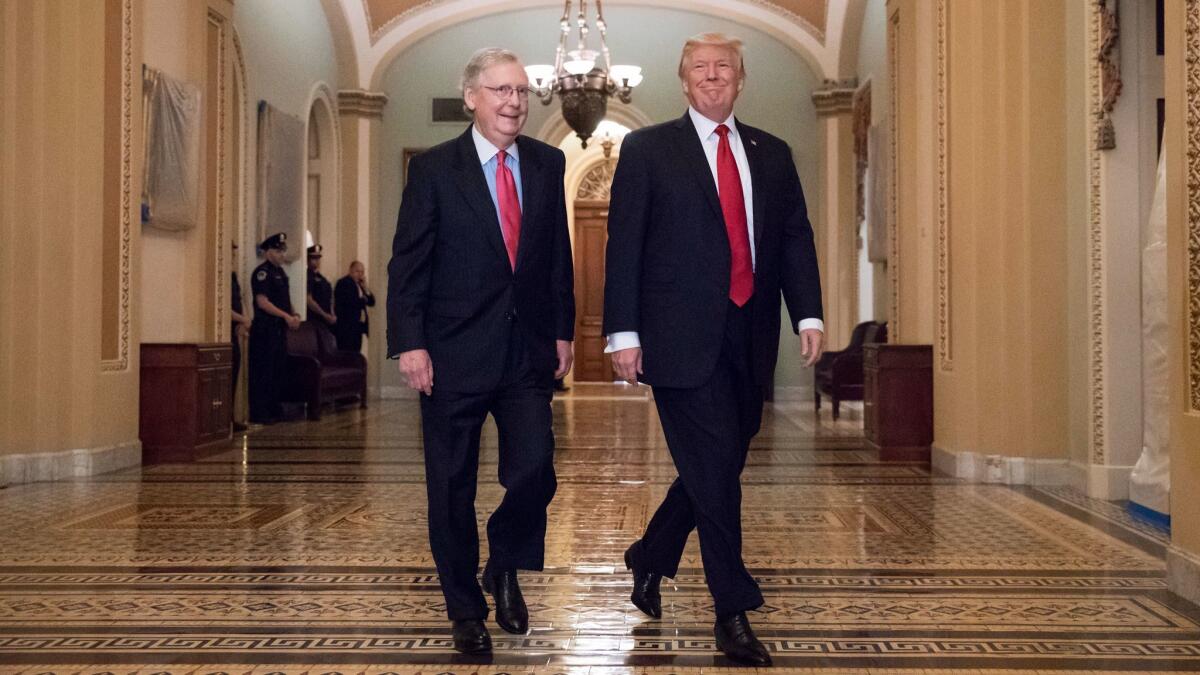Opinion: Fake tax relief for the middle class

Good morning. I’m Paul Thornton, and it is Saturday, Oct. 28, 2017. Let’s take a look back at the week in Opinion.
All hail
On that latter point, however, Flake has his own blind spot. In this era of so-called fake news and fake anything that reflects poorly on
I joined the White House as a speechwriter in 2011, and wrote speeches for President Obama on the 2012 campaign when income inequality became a major issue among the electorate. In poll after poll, focus group after focus group, it was clear that tax cuts for the wealthy were massively unpopular. It was equally clear that the Republican Party was wedded to them.
That’s still true today. For nearly a decade, the centerpiece of the Republican agenda has been toxic with voters. This, to put it mildly, is a dilemma for a political party. As early as 2008, the GOP was faced with three options: A) dial back the tax cuts; B) persuade skeptical Americans that tax cuts would be good for them; C) find another way to win elections.
They chose C. Donald Trump is president today not because he championed conservative ideas on taxes and spending, but because he promised to reject them. He pledged to protect so-called entitlements and said on the campaign trail that “hedge fund guys” would “be paying up.” He did promise tax cuts — but said he would focus on the middle class.
Which brings us to the debate currently taking place. The nonpartisan Tax Policy Center has analyzed Trump’s framework. In 2018, the wealthiest 1% would receive more than 50% of the benefits. By 2027, the top 0.01% of earners would receive more than 40% of the benefits, while the bottom 80% would receive just 13%.
Faced with the unpopularity of tax cuts that are enormously regressive, the Republicans’ strategy is simple: pretend they’re not. With the help of some alternative math, White House Press Secretary Sarah Huckabee Sanders declared that the average American family “would get a $4,000 raise” under Trump’s proposal. House Speaker Paul D. Ryan (R-Wis.) said the proposal is about helping families who live paycheck to paycheck. Trump himself has called his plan a “middle-class bill.”
None of these things is remotely true.
About that tax-cut “raise” — don’t count on it. Doyle McManus calls the White House’s insistence that the GOP tax plan will give each American a raise of between $4,000 and $5,000 “inflated at best, and largely made up at worst.” Behind these figures, McManus says, are a lot of assumptions, rarely borne out by reality, about businesses passing along tax savings to workers and consumers. And with Trump at the helm, there’s no guarantee tax reform will pass at all. L.A. Times
“Vision Zero” is crumbling. L.A. Mayor
Will lax Arizona gun laws come to California? They might, if Congress takes the stunning step in the wake of the Las Vegas mass shooting of passing the Concealed Carry Reciprocity Act of 2017. The bill would force states that place strong limits on gun ownership — like, say, California — to honor concealed carry permits from other states, including the 12 that place no limits at all on which people can walk around armed, provided they meet the minimal federal requirements to buy a gun. L.A. Times
Harvesting fog to survive water scarcity: Early Californians may have done it in places where no reliable freshwater supply existed, according to researchers. Anthropologists at Cal State Channel Islands recently discovered evidence that tiny Santa Barbara island, a craggy 1-square-mile piece of the Channel Islands, may have been more than just a stopping point for further travels. It could provide lessons for modern Californians who must deal with increasing water scarcity because of climate change. Pacific Standard
She can barely function without Vicodin, and she hopes President Trump’s declaration of a public health emergency over opioid-related deaths doesn’t jeopardize that availability of her medication. Melissa Sanders-Self, a literature and creative writing instructor at UC Santa Cruz, has undergone cancer treatment for three years that would otherwise make it impossible for her to do her job without opioids. “For millions of people suffering from chronic, acute pain, regular life would be impossible without this medication,” she writes. “Limits on opioid prescriptions will harm patients like me.” L.A. Times
Reach me: paul.thornton@latimes.com
